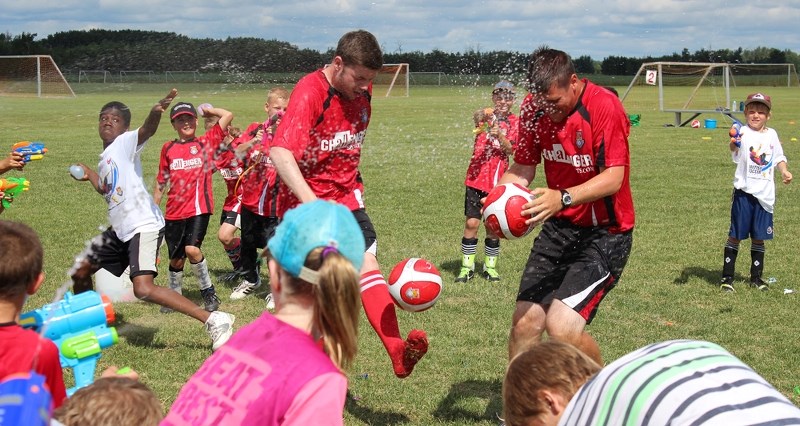The Challenger Sports British Soccer Camp arrived in St. Paul on Canada Day, and hosted five days of drills, games and boisterous antics with instructors Chris Duff and Mark Austin.
Duff, from Newcastle, England, and Austin, from the Scottish Highlands, both played at the college level and are certified coaches in their home countries.
Players of varying ages and skill levels joined Duff and Austin throughout the week. Eleven-year-old Ryan Mulkay said he wanted to sign up for the camp because he has “never taken soccer before and thought it would be fun,” while Tycen Nakonachny, 11, has been at the camp all three years running.
“I’ve been here for three years and I liked it so far, so I came back,” Nakonachny said, adding the camp has given him a number of skills to bring into the soccer season. “I’ve learned some pretty cool dekes that helped me this year to get away from other players.”
Kids involved in the full-day camp are led through drills in the mornings that work on specific skills such as short and long passing, feints and shooting.
At 11 a.m. each day Duff and Austin hold a coaches challenge to entertain the campers. On Wednesday, the challenge was to see which coach could roll the farthest on their chest over a row of soccer balls using a running start. The campers judged the challenge and determined Duff was the day’s winner.
Afternoons at the program feature more of a game-style approach, and on Wednesday campers were put into world cup teams like Greenland, Lichtenstein and Kenya.
A number of kids came to the pitch dressed up in country-themed costumes, such as 10-year-old Taylor Hebert, who came wearing a whale hat, an artic bunny hand puppet and a scarf to represent Greenland.
Cassia Lumby, 11, said that even the high heat experienced early last week didn’t have an effect on the amount of fun she had on the pitch.
“(At Monday’s lunch break) my dad was like ‘do you really want to go back?’ And I said ‘yes, yes I do,’” she said, adding, the antics between campers and coaches helped keep the mood positive while keeping everyone cool.
“The coaches are really nice and they do tricks on us, too, and it’s really fun. He gave me a drink from his water bottle and then tipped up the back and it sprayed all over my face, but then I got him back by spraying water all over his face,” said Lumby.
Austin said he has enjoyed traveling overseas to help grow the game of soccer in North America.
“As soon as you walk in England you’re kicking a ball for most boys and girls. It’s getting that way here, but I think they’re raised on hockey so much,” Austin said, adding that U15s in Canada play at roughly a U11 level in England. “They’re so aggressive and competitive in the U.K. with football, with soccer, and since it’s kind of a growing sport here and they’re still learning it, they’re more friendly. They’re so serious in England.”
Duff added that he too feels there is a different, friendlier approach to the game here, which he said has been reflected by the attitude of the kids at camp.
“I think the kids sometimes are more willing to learn because it’s an opportunity you don’t get all the time whereas in England you do,” he said. “They seem to pay attention a lot more and they want to really take part in all of it.”
Austin pointed out that there are striking similarities between Canada’s hockey culture and the soccer culture in Great Britain.
“In the U.K. as long as you have two t-shirts spare that you could use for goalposts you can play in the street, you can play anywhere. Here, unless they’ve got a field, goalposts and kits they don’t always play so much,” Austin said.
“That’s the difference I see, and it’s probably the same with hockey. We wouldn’t play hockey unless we have everything, whereas here if they have some rollerblades, some sticks and a stone, they’ll play in the street.”
Duff added he has been enjoying his time in Canada so much, that he stayed here for the year to work in construction on a one-year visa.
“I was in the same region (last year) but I didn’t come to St. Paul,” Duff said. “Last year after my time with Challenger ran out, we get a year visa and I just stayed and worked construction and I’m doing the same thing this year.”



